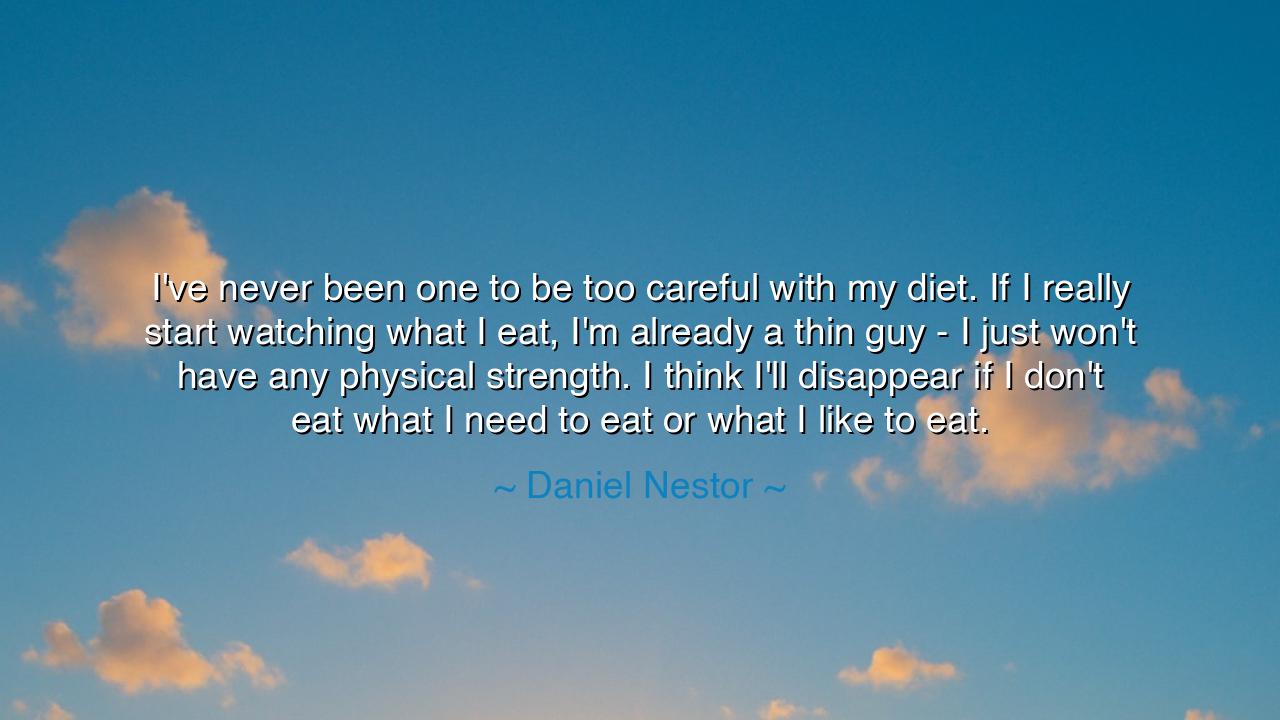
I've never been one to be too careful with my diet. If I really
I've never been one to be too careful with my diet. If I really start watching what I eat, I'm already a thin guy - I just won't have any physical strength. I think I'll disappear if I don't eat what I need to eat or what I like to eat.






The words “I’ve never been one to be too careful with my diet. If I really start watching what I eat, I’m already a thin guy — I just won’t have any physical strength. I think I’ll disappear if I don’t eat what I need to eat or what I like to eat” by Daniel Nestor carry within them a profound truth disguised as simplicity — the eternal wisdom of balance. These words do not merely concern food; they concern the soul’s relationship to life itself. Nestor, a world-renowned tennis player, speaks from the experience of one who has known both discipline and depletion, both mastery and moderation. His statement is not an excuse for indulgence, but a hymn to vitality — to the sacred equilibrium between control and freedom, between strength and nourishment.
To say “I’ve never been one to be too careful with my diet” is to reject the tyranny of excess caution. In a world obsessed with measurement, regulation, and perfection, Nestor reminds us that health is not found in fear. There is a kind of madness in over-control, a spiritual starvation that comes from treating the body as a battlefield rather than a companion. The ancients understood this: in the philosophy of Aristotle’s Golden Mean, virtue is found not in the extremes of gluttony or abstinence, but in the balanced center — the point where discipline serves life, rather than diminishes it.
When Nestor says he would “lose physical strength” by being too careful, he reveals a wisdom rooted in experience. For strength — both physical and spiritual — does not grow from deprivation, but from wholeness. The body, like the spirit, requires trust. To feed it properly, one must listen, not dictate. The one who starves themselves in pursuit of perfection forgets that energy, not appearance, is the essence of vitality. In this, Nestor’s insight extends beyond sport; it is a parable for every human striving toward excellence. Too much control dulls the fire. Too much denial kills the joy.
The ancients would have seen this truth mirrored in the athletes of ancient Olympia, who trained not to punish their bodies, but to perfect their harmony with them. They knew that a hungry warrior cannot fight, and a weary heart cannot triumph. Likewise, Nestor, in his wisdom, understands that the body is not an enemy to be subdued, but an ally to be respected. His words whisper the ancient truth: strength is born of nourishment — of giving oneself what is truly needed, not what appears virtuous.
His statement “I think I’ll disappear if I don’t eat what I need to eat or what I like to eat” is both literal and metaphysical. To disappear is not only to lose flesh, but to lose presence — the fullness of being alive. Life without pleasure, without sustenance, becomes a shadow of itself. The person who denies their simplest joys in pursuit of control risks vanishing into emptiness. This is not merely a warning against dietary obsession; it is a warning against all forms of spiritual austerity. To love what nourishes you — whether it be food, art, laughter, or companionship — is to stay rooted in the world, visible, alive, and strong.
In this way, Nestor’s words carry the same essence as those of Epicurus, who taught that pleasure, in its purest form, is not gluttony but gratitude. To eat what you love, in moderation, is to honor the gift of life itself. It is to understand that pleasure and health are not enemies, but siblings. Deny one, and the other withers. Indulge both with awareness, and they flourish together. This balance — this divine middle ground — is the essence of wisdom in all things.
And so, children of both appetite and discipline, let this be your teaching: do not let control consume your humanity. Eat to live, but also live to enjoy. Listen to the body’s needs as you would listen to the voice of an old friend — with care, not command. Remember that strength is not built from denial, but from nourishment. Feed your body with food that sustains, and feed your soul with moments that delight. As Daniel Nestor reminds us, if we starve ourselves of what we love, we do not become better — we begin to disappear. But when we nourish ourselves wisely and joyfully, we do not merely live — we thrive.






AAdministratorAdministrator
Welcome, honored guests. Please leave a comment, we will respond soon